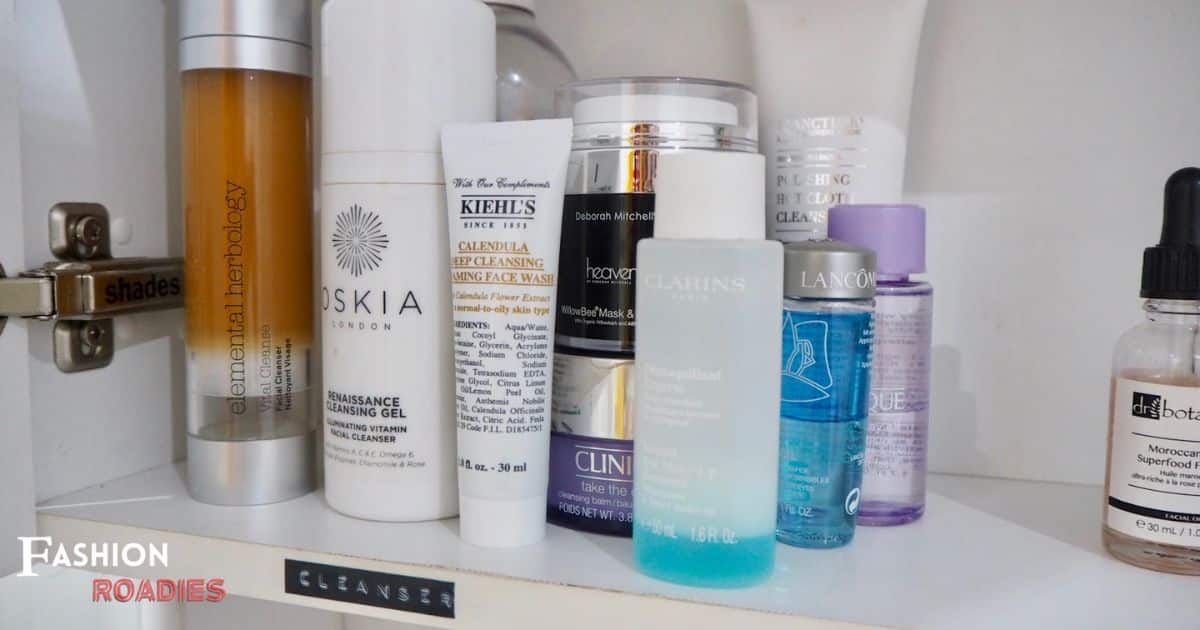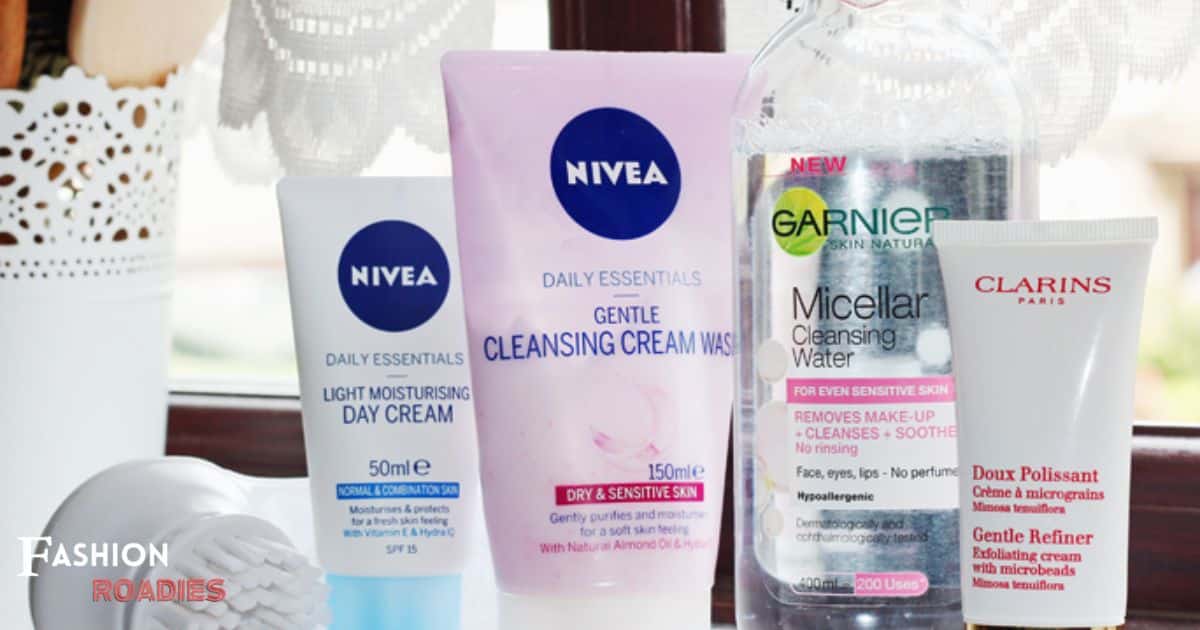In the quest for flawless and radiant skin, finding the perfect skincare routine can feel like searching for a needle in a haystack. But fear not, for we are here to guide you through this process with expert advice and evidence-based recommendations. Like a compass guiding a lost traveler, our comprehensive guide will help you navigate the vast world of skincare, enabling you to customize a regimen that caters to your unique skin type and concerns. Join us on this journey to unlock your skin’s true potential and find your rightful place in the realm of skincare enthusiasts.
Key Takeaways
- Assess your skin type and concerns to select appropriate products
- Research and gather information about different products and their ingredients
- Establish a daily cleansing routine using a suitable cleanser and moisturizer
- Incorporate exfoliation, masking, and targeted treatments to personalize your routine
Assess Your Skin Type
During the initial stages of establishing a skin care routine, it is crucial to thoroughly assess your skin type to ensure the selection of appropriate products. Identifying your skin type is the first step towards achieving healthy and radiant skin. There are four main skin types: oily, dry, combination, and sensitive. Oily skin tends to produce excess sebum, leading to a shiny complexion and potential acne breakouts. Dry skin, on the other hand, lacks moisture and can feel tight and flaky. Combination skin exhibits both oily and dry areas, with the T-zone (forehead, nose, and chin) typically being oily. Lastly, sensitive skin is easily irritated and prone to redness and inflammation. Once you have identified your skin type, you can choose products specifically formulated to address your skin’s unique needs, whether it’s oil control, hydration, or gentle care for sensitive skin.
Identify Your Skin Concerns
Once you have assessed your skin type, it is important to identify your specific skin concerns in order to tailor your skincare routine accordingly. Skin concern analysis is a crucial step in achieving healthy and radiant skin. By taking a problem-solving approach, you can address your unique skin issues effectively. Here are some common skin concerns to consider:
- Acne: Whether it’s occasional breakouts or persistent acne, finding products that target acne-causing bacteria can help clear up your complexion.
- Dryness: If your skin feels tight, itchy, or flaky, look for moisturizers and serums that provide intense hydration.
- Aging: Fine lines, wrinkles, and loss of elasticity can be minimized with anti-aging products containing ingredients like retinol or peptides.
- Hyperpigmentation: Dark spots and uneven skin tone can be treated with products that contain ingredients like vitamin C or niacinamide.
- Sensitivity: If your skin is easily irritated or prone to redness, opt for gentle, fragrance-free products that soothe and protect the skin’s barrier.
Research and Select Suitable Products
After identifying your specific skin concerns, it is essential to research and select suitable products that address those issues effectively. The research process involves gathering information about different products, their ingredients, and their benefits. This can be done through reading reviews, consulting dermatologists or estheticians, and exploring reputable skincare websites. When selecting products, it is important to consider your skin type, any known allergies or sensitivities, and the specific concerns you want to target. To help you get started, here is a table outlining some common skin concerns and suitable product recommendations:
| Skin Concern | Suitable Products |
|---|---|
| Acne-prone skin | Salicylic acid cleanser, benzoyl peroxide spot treatment |
| Dry skin | Hyaluronic acid serum, moisturizing cream |
| Aging skin | Retinol cream, vitamin C serum |
| Hyperpigmentation | Glycolic acid toner, brightening serum |
| Sensitive skin | Fragrance-free cleanser, gentle moisturizer |
Establish a Daily Cleansing Routine
To maintain healthy and clear skin, it is crucial to establish a regular and thorough daily cleansing routine. Cleansing your skin helps remove dirt, oil, and impurities that can clog your pores and lead to breakouts. Here are some key steps to include in your daily routine:
- Choose the right cleanser: Find a cleanser that suits your skin type and addresses your specific concerns, such as acne or dryness.
- Cleanse twice a day: Cleanse your face in the morning and evening to remove any buildup from overnight and throughout the day.
- Be gentle: Use a gentle cleanser and avoid scrubbing too vigorously, as this can irritate the skin.
- Consider double cleansing: If you wear makeup or sunscreen, consider using an oil-based cleanser followed by a water-based cleanser for a deep cleanse.
- Follow with moisturizer: After cleansing, apply a daily moisturizer to hydrate and protect your skin.
Incorporate Exfoliation and Masking
The incorporation of exfoliation and masking into your skincare routine can provide numerous benefits for your skin. Exfoliation is the process of removing dead skin cells from the surface of your skin, revealing a fresh and radiant complexion. It helps to unclog pores, prevent acne breakouts, and improve the texture of your skin. There are different exfoliation methods available, including physical exfoliation with scrubs or brushes, as well as chemical exfoliation with ingredients like alpha hydroxy acids (AHAs) or beta hydroxy acids (BHAs).
Masking, on the other hand, involves applying a specialized treatment to your skin to address specific concerns. There are various types of masks available, such as clay masks for deep cleansing and oil absorption, sheet masks for hydration and brightening, and gel masks for soothing and cooling the skin. Masking techniques can help to nourish and rejuvenate your skin, providing it with the essential nutrients and hydration it needs.
Now that you understand the benefits of exfoliation and masking, it’s time to introduce targeted treatments that can address specific skin concerns.
Introduce Targeted Treatments
One key step in finding an effective skin care routine is to incorporate two to three targeted treatments that address specific skin concerns. These treatments can help customize your product selection and target specific issues, resulting in a more tailored and effective routine. Here are some targeted treatments to consider:
- Vitamin C serums: These serums brighten the skin and reduce the appearance of dark spots.
- Retinol creams: Retinol helps reduce fine lines, wrinkles, and improve skin texture.
- Hyaluronic acid moisturizers: These moisturizers hydrate the skin, plump up fine lines, and improve overall skin elasticity.
- Salicylic acid cleansers: Salicylic acid helps unclog pores, reduce acne, and control oil production.
- Niacinamide serums: Niacinamide helps minimize pores, control oil production, and improve overall skin tone.
Adapt and Adjust as Needed?
Adapting and adjusting your skin care routine is crucial to achieving optimal results. Personalizing your routine based on your skin type, concerns, and goals is the first step. Through trial and error, you can determine which products and ingredients work best for you. Lastly, it is important to listen to your skin and make adjustments as needed, as our skin’s needs can change over time. By continuously adapting and adjusting your routine, you can ensure that your skin is receiving the care it needs to stay healthy and radiant.
Personalize Your Routine
To achieve optimal results, it is essential to personalize your skin care routine by adapting and adjusting it as needed. Finding the right products and customizing them for your specific needs is key to achieving healthy, glowing skin. Here are five important considerations when personalizing your skin care routine:
- Skin type: Determine whether you have dry, oily, combination, or sensitive skin to select products that cater to your specific needs.
- Concerns: Identify any specific skin concerns you have, such as acne, wrinkles, or hyperpigmentation, and choose products that address these issues.
- Ingredients: Research and choose products with ingredients that are known to be effective for your skin type and concerns.
- Frequency: Determine how often you should use each product based on your skin’s needs, whether it’s daily, weekly, or monthly.
- Results: Regularly evaluate the results of your routine and make adjustments as needed to continuously improve your skin’s health and appearance.
Trial and Error
In order to achieve the perfect skin care routine, it is crucial to experiment with different products and techniques, and then adapt and adjust accordingly. Trial and error is an essential part of finding what works best for your skin. While it may seem overwhelming at first, this process allows you to discover alternatives that suit your individual needs. Trying out different products and methods can help you identify what ingredients and routines are most effective for your skin type and concerns. Additionally, seeking advice from skincare professionals or experts can provide valuable insights and recommendations. They can guide you towards products and techniques that are tailored to your specific skin concerns, further enhancing your skincare routine. Remember, finding the best skincare routine is an ongoing journey that requires flexibility and openness to change.
Listen to Your Skin
By paying close attention to the signals your skin is giving you, you can make necessary changes to your skincare routine. Your skin is unique, and its needs may change over time. Here are some tips to help you listen to your skin and adapt your routine accordingly:
- Observe how your skin reacts: Notice any changes in texture, color, or sensitivity.
- Identify triggers: Keep track of products or environmental factors that may cause irritation or breakouts.
- Consider your skin sensitivity: Choose gentle formulas and avoid harsh ingredients that may cause inflammation.
- Patch test new products: Apply a small amount of a new product on a small area of your skin to check for any adverse reactions.
- Seek professional advice: If you’re unsure about your skin’s needs, consult a dermatologist for personalized recommendations.
Frequently Asked Questions
Are There Any Natural Remedies or DIY Options for Creating a Skincare Routine?
There are numerous natural remedies and DIY options available for creating a skincare routine. These include using natural ingredients like tea tree oil and aloe vera for acne, and making homemade face masks for achieving a glowing complexion.
How Can I Determine if a Product Is Suitable for My Sensitive Skin?
To determine if a product is suitable for sensitive skin, it is important to examine the ingredients list and look for potential irritants. Additionally, performing a skincare patch test can help assess any adverse reactions before incorporating the product into a routine.
Should I Change My Skincare Routine Based on the Season or Weather Conditions?
Changing skincare routines based on the season or weather conditions is a common practice. Adjusting products and techniques can help address specific concerns such as dryness or excess oil. It is important to consider individual skin type and consult with a dermatologist for personalized advice.
What Are Some Common Mistakes People Make When Establishing a Skincare Routine?
Common mistakes people make when establishing a skincare routine include over-cleansing, skipping sunscreen, using too many products, and neglecting to adjust for different skin types. These common misconceptions can hinder the effectiveness of a skincare regimen.
Can I Use the Same Products for My Face and Body, or Should I Have Separate Skincare Routines for Each?
Using the same products for your face and body may not be ideal, as the skin on these areas have different needs. It is recommended to have separate skincare routines for each, tailored to their specific requirements.
Conclusion
In the quest for a healthy and radiant complexion, finding a suitable skincare routine is crucial. By assessing your skin type, identifying specific concerns, and researching suitable products, you can establish a daily cleansing routine that caters to your needs. Additionally, incorporating exfoliation, masking, and targeted treatments further enhances the effectiveness of your skincare regimen. Remember to adapt and adjust your routine as needed to achieve optimal results. Let your skin’s journey towards beauty and vitality be guided by knowledge, evidence, and care.










